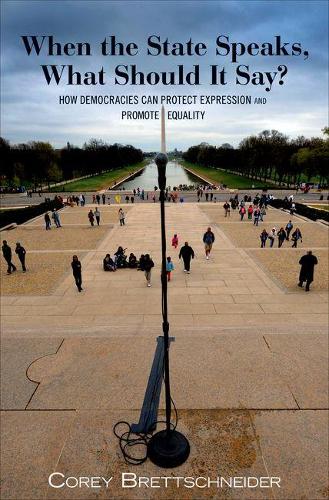
When the State Speaks, What Should It Say: How Democracies Can Protect Expression and Promote Equality
(Hardback)
Available Formats
Publishing Details
When the State Speaks, What Should It Say: How Democracies Can Protect Expression and Promote Equality
By (Author) Corey Brettschneider
Princeton University Press
Princeton University Press
2nd October 2012
United States
Classifications
Tertiary Education
Non Fiction
Political structures / systems: democracy
Political control and freedoms
Political science and theory
321.801
Physical Properties
Hardback
232
Width 152mm, Height 235mm
454g
Description
How should a liberal democracy respond to hate groups and others that oppose the ideal of free and equal citizenship The democratic state faces the hard choice of either protecting the rights of hate groups and allowing their views to spread, or banning their views and violating citizens' rights to freedoms of expression, association, and religion. Avoiding the familiar yet problematic responses to these issues, political theorist Corey Brettschneider proposes a new approach called value democracy. The theory of value democracy argues that the state should protect the right to express illiberal beliefs, but the state should also engage in democratic persuasion when it speaks through its various expressive capacities: publicly criticizing, and giving reasons to reject, hate-based or other discriminatory viewpoints. Distinguishing between two kinds of state action--expressive and coercive--Brettschneider contends that public criticism of viewpoints advocating discrimination based on race, gender, or sexual orientation should be pursued through the state's expressive capacities as speaker, educator, and spender. When the state uses its expressive capacities to promote the values of free and equal citizenship, it engages in democratic persuasion. By using democratic persuasion, the state can both respect rights and counter hateful or discriminatory viewpoints. Brettschneider extends this analysis from freedom of expression to the freedoms of religion and association, and he shows that value democracy can uphold the protection of these freedoms while promoting equality for all citizens.
Reviews
"[T]his book's argument is very strong, and its attention to anticipating and rebutting objections is both exceptional and laudable. When the State Speaks is likely to become the standard political-liberal treatise on the ways in which a democratic state should treat inegalitarian viewpoints--no small achievement given the persistence and quality of debates in this area."--Andrew Sabl, Perspectives on Politics
Author Bio
Corey Brettschneider is associate professor of political science and associate professor, by courtesy, of philosophy at Brown University. He is the author of "Democratic Rights: The Substance of Self-Government" (Princeton).
